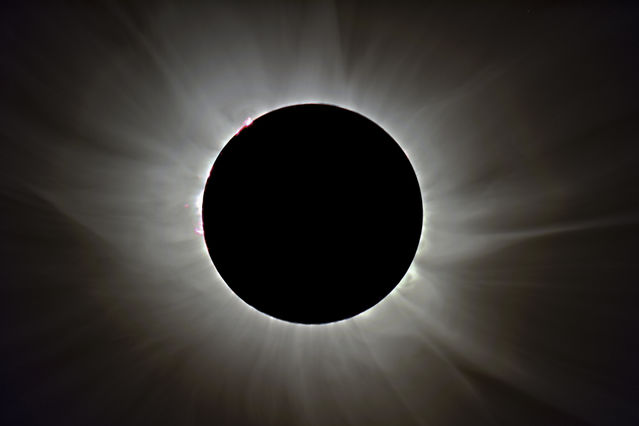Career
Kate Russo Wants to Experience the Solar Eclipse With You
A former psychologist shares the wonders of chasing eclipses.
Posted August 2, 2017

By Ellen Airhart
August 21, 2017 will bring the most accessible total solar eclipse that Kate Russo, Ph.D., has experienced in her 18 years as an eclipse chaser. Before that, she was a clinical psychologist, which puts her in the perfect position to lead American communities to the celestial party from her base in Wyoming. From there she will have a view of totality—the moon will pass in front of the sun, completely blocking it from view. We talked about her career transition, her subsequent adventures to remote islands, and why she has to pack sunscreen even though the moon will be blocking the sun.
Can you describe the first time you saw a solar eclipse?
I never expected it to be as awesome as it was. I knew I was going to see a total solar eclipse, I knew we would be in darkness, that the sun would be completely covered up by the moon. You can have an understanding of all that, but when it actually happens, it is so indescribable and so otherworldly—that’s why I think people get so thrown by the experience.
Have you heard of when astronauts come back down from space? They call it the overview effect. It’s the idea that you can see your life, your world, from an outside perspective. And obviously they do, because they are looking down from up above. It really changes them as people. They come back and they talk about feeling very humbled, seeing how precious and how fragile our life is. They really go out of their way to communicate to lots of people afterwards that we have to look after our world, that we are all connected. That there are bigger things in life than their everyday concerns. Seeing a total solar eclipse is the closest we can get to this while being on earth. In those moments, we can appreciate how vast the universe is.
When you stand in the shadow of the moon, you realize that the universe is in three dimensions. And then when you really get your head wrapped around that, that the moon casts a shadow, and that’s the darkness that you’re standing in, doesn’t that make that universe broaden out? The vastness, the understanding of how big the universe is—I think that’s why we feel so in awe during (a total solar eclipse). It’s hard to put into words. You feel insignificant, but connected to something much bigger. It’s a really powerful feeling, like you can take on the world.
What made you decide to make the career shift from a psychologist to a solar eclipse chaser?
It’s not actually a career shift. When I saw my first eclipse, I had settled in the U.K. I’m Australian, and I was traveling around the world. When I got to the U.K., I focused on my career as a clinical psychologist. But that’s also when I first saw my first total solar eclipse. I had two parallel lives. I had my day job in clinical psychology, and once every 18 months or so I would have these epic adventures and these life-affirming, life-changing moments. Then I would come back and continue in my job as a clinical psychologist.
Eclipse chasing also overlapped with my clinical work. I was working as a pediatric clinical psychologist with children who had chronic and acute medical conditions, and families who were experiencing loss were having these insights, where they truly understood how fleeting life is, how precious life is, and they lived day by day. Every moment was special. At moments of loss, we tend to realize that it’s not the things we have that are important, it’s the experiences we have and the people we share them with. But I was having a lot of these same insights during my time chasing solar eclipses. It struck me that we can get the same insight without having to experience a loss.
I started to think that if everyone could see a total solar eclipse, the world would be a better place. It doesn’t matter what color you are or what culture you’re from, what your beliefs are. None of those differences matter, because when everything is stripped away, when you’re standing in the shadow of the moon, all that matters is you and what you are seeing and experiencing. You understand completely that you would have felt exactly the same way if you were experiencing this thousands of years ago or thousands of years in the future.
How did you end up researching this experience in a more formal way?
I kept saying to myself that I wanted to research this experience in more depth. In 2005, I went to see this total eclipse that was difficult to get to: There were only two boats in the whole world that went into this path of totality (the area in which a total eclipse is observable), and I was on one of them. There were about 80 hard-core solar eclipse chasers with me. We went to the Galapagos Islands, but then we had to cruise another 800 miles further west. It’s quite a remote region.
For the first time, I met other eclipse chasers. I realized how similar we were in our lifestyles. A lot of us had the same outlook on life. We were very humble, we lived life very simply so we could afford to have these epic adventures, to be able to chase eclipses. I thought, “Right—I need to research this. There’s no one else who is more highly qualified to research this than me.”
I’m an eclipse chaser, I’m a psychologist. And I was getting into phenomenological research, which actually asks the question “What is it like to experience something?” It tries to tease out the essence of an experience. I think it was in 2010 that I pitched the idea to a publishing company. I took six months out of my work and I published my first book, Total Addiction. When you get that into something, you know there are more questions that you want answered. I wanted to know more about the first-time experiences. I wanted to capture people before their first eclipse and then talk to them afterwards, so I could know what it was like. That’s why I wrote my new book, Being in the Shadow.
How did your career change after you started writing about your findings?
I took six months off work to focus on gathering research for my next book, because the path of totality was happening in my home region. This was in 2012. Afterwards, I had a significant health issue. I was ill for quite a long time—about a year. The university held my job open for as long as they could, but after a year and a half, I had to leave on health grounds. You lose a lot of that when you lose your health, and it’s a challenging time. I fell back on my eclipse-chasing passion. I was able to sit and think about what’s important to me, and I thought that maybe that was the time to write more about the eclipse and prepare for 2017.
What's special about the 2017 eclipse?
In 2015, when I saw the total solar eclipse in the Faroe Islands—I was the eclipse consultant there, involved with planning and preparation, and I was also leading a tour group. I was already mentioning the 2017 eclipse as something that was going to be huge. Because it goes right across the U.S., it’s the most accessible path of totality that I’ve seen in all my years of chasing. Instead of going to these remote islands or arctic regions, most people could easily travel to the U.S. and get into the path of totality.

How has your work as a psychologist helped inform your work as a solar eclipse chaser?
I definitely think it’s because I am a psychologist that I have a lot of transferrable skills that have benefitted the eclipse work that I do. When I was working as a psychology consultant, one of the things I taught was communication skills. I have a background where evidence-based practice is really important. I ground my research in strong ethics—it’s rigorous and robust. It’s not like I am simply gathering stories.
I'm not the only one who is applying her career to her eclipse passion. The more eclipses you see, the more you want to share it with people. You draw upon your experiences and your expertise. For me, that’s the consulting, the communication, the research. Michael Zeiler, a cartographer, is behind the website Great American Eclipse. You have eclipse-chasing meteorologists. Lots of people with computer and IT skills program things, like automated camera programs, so that people can watch the eclipse while they’re doing the photography. Other programs help identify flight paths that maximize time in totality. People are writing and creating cartoons. Teaching, lecturing, documentary filmmaking.
What can people do to set themselves up to enjoy the eclipse as much as possible?
Give yourself permission to purely be in the moment. Whatever people do these days, they have a phone, they’re recording things. I hear a lot of people say they're going to live-broadcasting it from their location—which is wonderful, but when you’re focused on multitasking, it takes away your ability to get fully lost in the moment. Totality is so brief. Two minutes, 41 seconds is the maximum totality for this eclipse. So much happens in that moment, so much happens above you, around you, and within you.
Lots of other chasers have camera equipment—they’ve got laptops, binoculars, telescopes. The only thing I take with me are solar filters. Over the years I’ve learned to also take sunscreen. I’ve gotten so sunburnt.
That seems counterintuitive.
It does! But you’re out in the sun, you’re exposed while you’re waiting for this to happen. Have lots of water with you.
I interview people about their first experience. Some older people in the Faroe Islands were telling me about their first time seeing a total solar eclipse in 1954. They could remember every detail. So don’t worry that you will forget it if you can’t take photos. It will remain alive for you.
That reminds me of the times I have tried to take a picture of a full moon, and it just looks like a blob.
You always think you can do it. But you might take photos that you look at once and then never again. Whereas memories stay with you forever. After the eclipse, people are desperate to share their experience. They can come to my website, complete my survey, and by doing that they’re taking part in further research to help us understand this amazing experience.
What do you recommend if people can’t make the solar eclipse this year?
I feel sorry for them. We know that life happens and people can’t just drop everything. That’s fine, but do what you can. You hear lots of stories about how it’s completely crowded around the path, that there’s no accommodation available. If you want to go, figure out where you want to go and approach these towns directly. If you approach the tourism person in that town, they will tell you the arrangements that are being made. Don’t give up at the first hurdle—it’s not too late. It is so worth it. If you can’t experience this one, the next one in the U.S. is in 2024.
When’s the next eclipse outside the U.S.?
It’s in 2019, and it goes across the Pacific and into South America, into Chile and Argentina. In 2020, it follows a similar path. It’s a great time to start learning Spanish.
Unless they have traveled, anyone under 40 who lives in the U.S. has not seen a total solar eclipse. A whole generation of people in the U.S. are going to be able to see this for the first time. And that’s pretty special.
This interview has been condensed and edited for clarity.
Ellen Airhart (@ellenairhart) is an editorial intern at Psychology Today.




